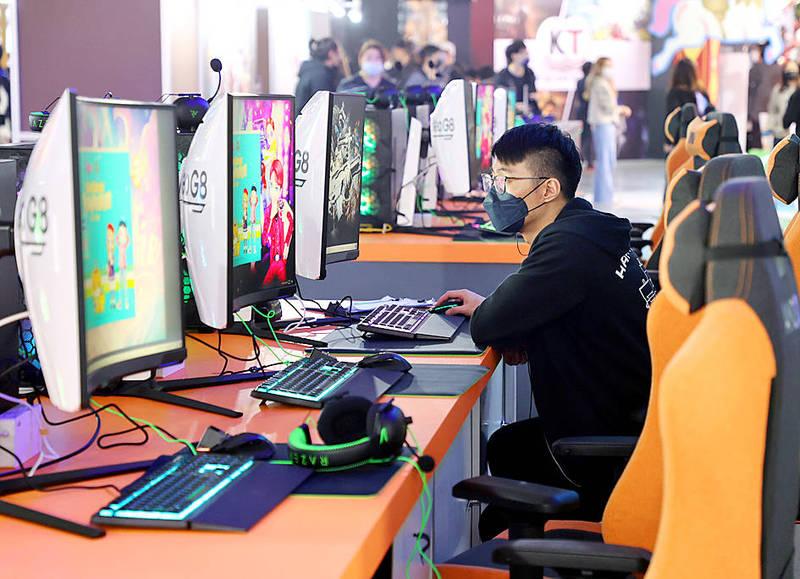An Academia Sinica study of the gaming platform Steam found that video games translated into the local language saw up to a 12.1 percent increase in sales revenue in the local market, marking the first study to provide concrete data on how translation benefits international trade.
Translating products reduces cultural barriers and makes them more accessible to local consumers, but industries have long struggled to quantify the benefits of translation to international trade.
A team led by Academia Sinica Institute of Economic researcher Yang Tsung-han (楊宗翰) and Japanese researcher Yuta Watabe analyzed sales of more than 10,000 games in 2018 to more than 70 countries on Steam, which accounts for 70 percent of global game releases.

Photo: CNA
They found that games translated into local languages generated at least 10 percent higher sales revenue in those markets, showing the benefits of product localization.
Yang said that his team chose not to use books as their subject, as different versions of books in different languages compete with each other on bookstore platforms.
Video games, on the other hand, only have one version and players can freely choose different languages in the game settings, Yang said.
In addition, video game sales have surpassed film, music and sports, and they can be instantly purchased across borders online, he said.
Game translations and subtitles also directly affect player experience, making the game easier to learn and understand, he added.
Yang said that games with more language options are typically released by bigger companies, as translating a game into multiple languages requires greater financial investment.
How much financial firepower a company has naturally determines its ability to use translation to bridge cultural and linguistic divides, he said.
However, the data were collected before ChatGPT and other artificial intelligent (AI) translation tools rose to prominence, Yang said.
The team’s model suggests that AI tools such as real-time subtitle translation, although not yet fully accurate, are further breaking down language and cultural barriers in global trade, Yang said.
This trend extends beyond cultural products to general consumer goods, with platforms such as Amazon seeing sales growth tied to automatic translation, he said.
The team now plans to study the economic impact of AI-driven localization before and after these tools became widespread, he added.
The study was published in the European Economic Review.

SHIPS, TRAINS AND AUTOMOBILES: The ministry has announced changes to varied transportation industries taking effect soon, with a number of effects for passengers Beginning next month, the post office is canceling signature upon delivery and written inquiry services for international registered small packets in accordance with the new policy of the Universal Postal Union, the Ministry of Transportation and Communications said yesterday. The new policy does not apply to packets that are to be delivered to China, the ministry said. Senders of international registered small packets would receive a NT$10 rebate on postage if the packets are sent from Jan. 1 to March 31, it added. The ministry said that three other policies are also scheduled to take effect next month. International cruise ship operators

HORROR STORIES: One victim recounted not realizing they had been stabbed and seeing people bleeding, while another recalled breaking down in tears after fleeing A man on Friday died after he tried to fight the knife-wielding suspect who went on a stabbing spree near two of Taipei’s busiest metro stations, Taipei Mayor Chiang Wan-an (蔣萬安) said. The 57-year-old man, identified by his family name, Yu (余), encountered the suspect at Exit M7 of Taipei Main Station and immediately tried to stop him, but was fatally wounded and later died, Chiang said, calling the incident “heartbreaking.” Yu’s family would receive at least NT$5 million (US$158,584) in compensation through the Taipei Rapid Transit Corp’s (TRTC) insurance coverage, he said after convening an emergency security response meeting yesterday morning. National

PLANNED: The suspect visited the crime scene before the killings, seeking information on how to access the roof, and had extensively researched a 2014 stabbing incident The suspect in a stabbing attack that killed three people and injured 11 in Taipei on Friday had planned the assault and set fires at other locations earlier in the day, law enforcement officials said yesterday. National Police Agency (NPA) Director-General Chang Jung-hsin (張榮興) said the suspect, a 27-year-old man named Chang Wen (張文), began the attacks at 3:40pm, first setting off smoke bombs on a road, damaging cars and motorbikes. Earlier, Chang Wen set fire to a rental room where he was staying on Gongyuan Road in Zhongzheng District (中正), Chang Jung-hsin said. The suspect later threw smoke grenades near two exits

The Forestry and Nature Conservation Agency yesterday launched a gift box to market honey “certified by a Formosan black bear” in appreciation of a beekeeper’s amicable interaction with a honey-thieving bear. Beekeeper Chih Ming-chen (池明鎮) in January inspected his bee farm in Hualien County’s Jhuosi Township (卓溪) and found that more than 20 beehives had been destroyed and many hives were eaten, with bear droppings and paw prints near the destroyed hives, the agency said. Chih returned to the farm to move the remaining beehives away that evening when he encountered a Formosan black bear only 20m away, the agency said. The bear